Anne Hendricks's Blog
September 21, 2017
Corrie ten Boom – and How She Helped Me To Forgive…
 Corrie ten Boom has always been my heroine. When I spent years trying to work up the ability to forgive Dr. James Gay, the abortionist of Northside Women's Clinic of Atlanta, I would go to the story of Corrie being confronted, face to face, with a Nazi torturer from the death camp she survived. Her sister, also tortured by this Nazi guard, did not survive Ravensbruck - but Corrie did. Her story is amazing. Corrie's own words, when the guard approached her after a church services where she spoke in Munich, Germany (1947), "“Now he was in front of me, hand thrust out: ‘A fine message, Fräulein! How good it is to know that, as you say, all our sins are at the bottom of the sea!’ “And I, who had spoken so glibly of forgiveness, fumbled in my pocketbook rather than take that hand. He would not remember me, of course—how could he remember one prisoner among those thousands of women? But I remembered him and the leather crop swinging from his belt. I was face-to-face with one of my captors and my blood seemed to freeze."I insert my own story - when I exited Northside Women's Clinic, at 11:45 on March 9, 1991, through the back door of a second trimester abortion of a baby girl, I was literally carried by my mother and stuffed into the backseat of a car - and my father had to drive through protesters, yelling, "Baby killer! Murderer!" and my mother was heard through my semi-conscious state, screaming, "Judge not! She's not like the other girls!" I was 18 - and no matter what or why - I WAS like the other girls. I remember nothing but wanting to die - and asking myself how Dr. James Gay could live with himself, as he performed hundreds of abortions a week - and pocketed the blood money. I was as guilty as him - although pushed into this "choice" with a special needs unborn daughter - but as years passed, I grew to hate myself - and him. My salvation back to Christ came in 1994 through Monsignor Regan of Carrollton, GA - who recognized the symptoms of Post Abortion Syndrome - and he got me to help - and eventually, back to Christ and my conversion to Catholicism. Corrie's story continues, “ ‘You mentioned Ravensbruck in your talk,’ he was saying, ‘I was a guard there.’ No, he did not remember me... ‘But since that time,’ he went on, ‘I have become a Christian. I know that God has forgiven me for the cruel things I did there, but I would like to hear it from your lips as well. Fräulein,’ again the hand came out—’will you forgive me?’ Corrie stood in shock - “I whose sins had again and again to be forgiven—and could not forgive. Betsie had died in that place—could he erase her slow terrible death simply for the asking? It could not have been many seconds that he stood there—hand held out—but to me it seemed hours as I wrestled with the most difficult thing I had ever had to do.Corrie, oh Corrie - "For I had to do it — I knew that. The message that God forgives has a prior condition: that we forgive those who have injured us. ‘If you do not forgive men their trespasses,’ Jesus says, ‘neither will your Father in heaven forgive your trespasses.’"Back to me: In my own time, after I returned to the Lord, I was in a therapy session with other post abortive survivors as we discussed how we had forgiven ourselves through Christ's mercy - but the subject of forgiving the actual doctor who had done the deed - our abortionists - the individual who had physically killed our unborn children - could we do that? Could we forgive them?I was the leader of that week's group meeting and I admitted... I had not forgiven Dr. James Gay. By that time, I was a mother - had suffered miscarriages too - and I had suffered uterine damage for sixteen years that resulted in a hysterectomy. Could I trace it to Dr. James Gay's surgery on me on March 9, 1991?In my mind, yes. In my personal ob-gyn's personal opinion, maybe. But legally - I never sought restitution. I just never forgave Dr. Gay - and even, perhaps, I hated him. I hated him as much as I had once hated myself.Corrie's story got to the point of this blog, "I knew it not only as a commandment of God, but as a daily experience. Since the end of the war I had had a home in Holland for victims of Nazi brutality. Those who were able to forgive their former enemies were able also to return to the outside world and rebuild their lives, no matter what the physical scars. Those who nursed their bitterness remained invalids. It was as simple and as horrible as that. And still I stood there with the coldness clutching my heart. But forgiveness is not an emotion—I knew that too. Forgiveness is an act of the will, and the will can function regardless of the temperature of the heart. ‘… Help!’ I prayed silently. ‘I can lift my hand. I can do that much. You supply the feeling.’ And so woodenly, mechanically, I thrust my hand into the one stretched out to me. And as I did, an incredible thing took place. The current started in my shoulder, raced down my arm, sprang into our joined hands. And then this healing warmth seemed to flood my whole being, bringing tears to my eyes. ‘I forgive you, brother!’ I cried. ‘With all my heart!’ For a long moment we grasped each other’s hands, the former guard and the former prisoner. I had never known God’s love so intensely, as I did then."Oh Corrie - I would later relate. After my admission to my post abortive support group, in 2007, I went home and got onto my knees and forgave Dr. James Gay. I never Googled the man - I never returned to that clinic after that 1991 visit - I moved on - as my Lord allowed me in my forgiveness and of course, my redemption. My penance is forever working with post abortive women - and helping pregnant women chose life. Like Corrie, I will go and tell my story - to whomever will listen. I am not worthy to compare myself to Corrie, but I think she would understand why I used her as an example of forgiveness.In 2014-2016, I wrote A WOMAN'S CHOICE - an indie Catholic fiction romance, where the heroine is post abortive and enters the ministry to help women like her get help. To revisit the emotions for one important scene, I asked my husband and son to accompany me to Northside Women's Clinic.The clinic was closed - an empty building. The sign was still up, but another one had been torn down - the neighborhood had changed - and as I write this, it is still for sale. I I also learned Dr. James Gay had died years ago. No more babies would die - no more women would end up, at that location, like me.My heart rejoiced and I went on to write that scene of Banner being an agent of change for her goddaughter's own choice - a choice of life.I honestly say I leave Dr. Gay to God's determination of his fate. It isn't my place to judge, just as Corrie ten Boom reminded herself that night after a church service in Munich, Germany. We have to forgive - even if it is hard. Reading his obituary (http://www.legacy.com/obituaries/atla...), one sees Dr. James Gay met his end, proud he that performed abortions, by asking for donations to Planned Parenthood. I can only pray that other doctors who are abortionists will realize the sin they are committing, repent, and join - like so many post abortive women - the goal to overturn Roe vs. Wade and make personhood for the unborn a federal law - more than a state law.By using Corrie Ten Boom - a victim of another situation, but still a warrior of Christ - she is an example of forgiving someone who had wronged them. I forgave Dr. James Gay a very long time ago - and I pray this blog helps someone to forgive.[image error]
Corrie ten Boom has always been my heroine. When I spent years trying to work up the ability to forgive Dr. James Gay, the abortionist of Northside Women's Clinic of Atlanta, I would go to the story of Corrie being confronted, face to face, with a Nazi torturer from the death camp she survived. Her sister, also tortured by this Nazi guard, did not survive Ravensbruck - but Corrie did. Her story is amazing. Corrie's own words, when the guard approached her after a church services where she spoke in Munich, Germany (1947), "“Now he was in front of me, hand thrust out: ‘A fine message, Fräulein! How good it is to know that, as you say, all our sins are at the bottom of the sea!’ “And I, who had spoken so glibly of forgiveness, fumbled in my pocketbook rather than take that hand. He would not remember me, of course—how could he remember one prisoner among those thousands of women? But I remembered him and the leather crop swinging from his belt. I was face-to-face with one of my captors and my blood seemed to freeze."I insert my own story - when I exited Northside Women's Clinic, at 11:45 on March 9, 1991, through the back door of a second trimester abortion of a baby girl, I was literally carried by my mother and stuffed into the backseat of a car - and my father had to drive through protesters, yelling, "Baby killer! Murderer!" and my mother was heard through my semi-conscious state, screaming, "Judge not! She's not like the other girls!" I was 18 - and no matter what or why - I WAS like the other girls. I remember nothing but wanting to die - and asking myself how Dr. James Gay could live with himself, as he performed hundreds of abortions a week - and pocketed the blood money. I was as guilty as him - although pushed into this "choice" with a special needs unborn daughter - but as years passed, I grew to hate myself - and him. My salvation back to Christ came in 1994 through Monsignor Regan of Carrollton, GA - who recognized the symptoms of Post Abortion Syndrome - and he got me to help - and eventually, back to Christ and my conversion to Catholicism. Corrie's story continues, “ ‘You mentioned Ravensbruck in your talk,’ he was saying, ‘I was a guard there.’ No, he did not remember me... ‘But since that time,’ he went on, ‘I have become a Christian. I know that God has forgiven me for the cruel things I did there, but I would like to hear it from your lips as well. Fräulein,’ again the hand came out—’will you forgive me?’ Corrie stood in shock - “I whose sins had again and again to be forgiven—and could not forgive. Betsie had died in that place—could he erase her slow terrible death simply for the asking? It could not have been many seconds that he stood there—hand held out—but to me it seemed hours as I wrestled with the most difficult thing I had ever had to do.Corrie, oh Corrie - "For I had to do it — I knew that. The message that God forgives has a prior condition: that we forgive those who have injured us. ‘If you do not forgive men their trespasses,’ Jesus says, ‘neither will your Father in heaven forgive your trespasses.’"Back to me: In my own time, after I returned to the Lord, I was in a therapy session with other post abortive survivors as we discussed how we had forgiven ourselves through Christ's mercy - but the subject of forgiving the actual doctor who had done the deed - our abortionists - the individual who had physically killed our unborn children - could we do that? Could we forgive them?I was the leader of that week's group meeting and I admitted... I had not forgiven Dr. James Gay. By that time, I was a mother - had suffered miscarriages too - and I had suffered uterine damage for sixteen years that resulted in a hysterectomy. Could I trace it to Dr. James Gay's surgery on me on March 9, 1991?In my mind, yes. In my personal ob-gyn's personal opinion, maybe. But legally - I never sought restitution. I just never forgave Dr. Gay - and even, perhaps, I hated him. I hated him as much as I had once hated myself.Corrie's story got to the point of this blog, "I knew it not only as a commandment of God, but as a daily experience. Since the end of the war I had had a home in Holland for victims of Nazi brutality. Those who were able to forgive their former enemies were able also to return to the outside world and rebuild their lives, no matter what the physical scars. Those who nursed their bitterness remained invalids. It was as simple and as horrible as that. And still I stood there with the coldness clutching my heart. But forgiveness is not an emotion—I knew that too. Forgiveness is an act of the will, and the will can function regardless of the temperature of the heart. ‘… Help!’ I prayed silently. ‘I can lift my hand. I can do that much. You supply the feeling.’ And so woodenly, mechanically, I thrust my hand into the one stretched out to me. And as I did, an incredible thing took place. The current started in my shoulder, raced down my arm, sprang into our joined hands. And then this healing warmth seemed to flood my whole being, bringing tears to my eyes. ‘I forgive you, brother!’ I cried. ‘With all my heart!’ For a long moment we grasped each other’s hands, the former guard and the former prisoner. I had never known God’s love so intensely, as I did then."Oh Corrie - I would later relate. After my admission to my post abortive support group, in 2007, I went home and got onto my knees and forgave Dr. James Gay. I never Googled the man - I never returned to that clinic after that 1991 visit - I moved on - as my Lord allowed me in my forgiveness and of course, my redemption. My penance is forever working with post abortive women - and helping pregnant women chose life. Like Corrie, I will go and tell my story - to whomever will listen. I am not worthy to compare myself to Corrie, but I think she would understand why I used her as an example of forgiveness.In 2014-2016, I wrote A WOMAN'S CHOICE - an indie Catholic fiction romance, where the heroine is post abortive and enters the ministry to help women like her get help. To revisit the emotions for one important scene, I asked my husband and son to accompany me to Northside Women's Clinic.The clinic was closed - an empty building. The sign was still up, but another one had been torn down - the neighborhood had changed - and as I write this, it is still for sale. I I also learned Dr. James Gay had died years ago. No more babies would die - no more women would end up, at that location, like me.My heart rejoiced and I went on to write that scene of Banner being an agent of change for her goddaughter's own choice - a choice of life.I honestly say I leave Dr. Gay to God's determination of his fate. It isn't my place to judge, just as Corrie ten Boom reminded herself that night after a church service in Munich, Germany. We have to forgive - even if it is hard. Reading his obituary (http://www.legacy.com/obituaries/atla...), one sees Dr. James Gay met his end, proud he that performed abortions, by asking for donations to Planned Parenthood. I can only pray that other doctors who are abortionists will realize the sin they are committing, repent, and join - like so many post abortive women - the goal to overturn Roe vs. Wade and make personhood for the unborn a federal law - more than a state law.By using Corrie Ten Boom - a victim of another situation, but still a warrior of Christ - she is an example of forgiving someone who had wronged them. I forgave Dr. James Gay a very long time ago - and I pray this blog helps someone to forgive.[image error] Corrie ten Boom has always been my heroine. When I spent years trying to work up the ability to forgive Dr. James Gay, the abortionist of Northside Women's Clinic of Atlanta, I would go to the story of Corrie being confronted, face to face, with a Nazi torturer from the death camp she survived. Her sister, also tortured by this Nazi guard, did not survive Ravensbruck - but Corrie did. Her story is amazing. Corrie's own words, when the guard approached her after a church services where she spoke in Munich, Germany (1947), "“Now he was in front of me, hand thrust out: ‘A fine message, Fräulein! How good it is to know that, as you say, all our sins are at the bottom of the sea!’ “And I, who had spoken so glibly of forgiveness, fumbled in my pocketbook rather than take that hand. He would not remember me, of course—how could he remember one prisoner among those thousands of women? But I remembered him and the leather crop swinging from his belt. I was face-to-face with one of my captors and my blood seemed to freeze."I insert my own story - when I exited Northside Women's Clinic, at 11:45 on March 9, 1991, through the back door of a second trimester abortion of a baby girl, I was literally carried by my mother and stuffed into the backseat of a car - and my father had to drive through protesters, yelling, "Baby killer! Murderer!" and my mother was heard through my semi-conscious state, screaming, "Judge not! She's not like the other girls!" I was 18 - and no matter what or why - I WAS like the other girls. I remember nothing but wanting to die - and asking myself how Dr. James Gay could live with himself, as he performed hundreds of abortions a week - and pocketed the blood money. I was as guilty as him - although pushed into this "choice" with a special needs unborn daughter - but as years passed, I grew to hate myself - and him. My salvation back to Christ came in 1994 through Monsignor Regan of Carrollton, GA - who recognized the symptoms of Post Abortion Syndrome - and he got me to help - and eventually, back to Christ and my conversion to Catholicism. Corrie's story continues, “ ‘You mentioned Ravensbruck in your talk,’ he was saying, ‘I was a guard there.’ No, he did not remember me... ‘But since that time,’ he went on, ‘I have become a Christian. I know that God has forgiven me for the cruel things I did there, but I would like to hear it from your lips as well. Fräulein,’ again the hand came out—’will you forgive me?’ Corrie stood in shock - “I whose sins had again and again to be forgiven—and could not forgive. Betsie had died in that place—could he erase her slow terrible death simply for the asking? It could not have been many seconds that he stood there—hand held out—but to me it seemed hours as I wrestled with the most difficult thing I had ever had to do.Corrie, oh Corrie - "For I had to do it — I knew that. The message that God forgives has a prior condition: that we forgive those who have injured us. ‘If you do not forgive men their trespasses,’ Jesus says, ‘neither will your Father in heaven forgive your trespasses.’"Back to me: In my own time, after I returned to the Lord, I was in a therapy session with other post abortive survivors as we discussed how we had forgiven ourselves through Christ's mercy - but the subject of forgiving the actual doctor who had done the deed - our abortionists - the individual who had physically killed our unborn children - could we do that? Could we forgive them?I was the leader of that week's group meeting and I admitted... I had not forgiven Dr. James Gay. By that time, I was a mother - had suffered miscarriages too - and I had suffered uterine damage for sixteen years that resulted in a hysterectomy. Could I trace it to Dr. James Gay's surgery on me on March 9, 1991?In my mind, yes. In my personal ob-gyn's personal opinion, maybe. But legally - I never sought restitution. I just never forgave Dr. Gay - and even, perhaps, I hated him. I hated him as much as I had once hated myself.Corrie's story got to the point of this blog, "I knew it not only as a commandment of God, but as a daily experience. Since the end of the war I had had a home in Holland for victims of Nazi brutality. Those who were able to forgive their former enemies were able also to return to the outside world and rebuild their lives, no matter what the physical scars. Those who nursed their bitterness remained invalids. It was as simple and as horrible as that. And still I stood there with the coldness clutching my heart. But forgiveness is not an emotion—I knew that too. Forgiveness is an act of the will, and the will can function regardless of the temperature of the heart. ‘… Help!’ I prayed silently. ‘I can lift my hand. I can do that much. You supply the feeling.’ And so woodenly, mechanically, I thrust my hand into the one stretched out to me. And as I did, an incredible thing took place. The current started in my shoulder, raced down my arm, sprang into our joined hands. And then this healing warmth seemed to flood my whole being, bringing tears to my eyes. ‘I forgive you, brother!’ I cried. ‘With all my heart!’ For a long moment we grasped each other’s hands, the former guard and the former prisoner. I had never known God’s love so intensely, as I did then."Oh Corrie - I would later relate. After my admission to my post abortive support group, in 2007, I went home and got onto my knees and forgave Dr. James Gay. I never Googled the man - I never returned to that clinic after that 1991 visit - I moved on - as my Lord allowed me in my forgiveness and of course, my redemption. My penance is forever working with post abortive women - and helping pregnant women chose life. Like Corrie, I will go and tell my story - to whomever will listen. I am not worthy to compare myself to Corrie, but I think she would understand why I used her as an example of forgiveness.In 2014-2016, I wrote A WOMAN'S CHOICE - an indie Catholic fiction romance, where the heroine is post abortive and enters the ministry to help women like her get help. To revisit the emotions for one important scene, I asked my husband and son to accompany me to Northside Women's Clinic.The clinic was closed - an empty building. The sign was still up, but another one had been torn down - the neighborhood had changed - and as I write this, it is still for sale. I I also learned Dr. James Gay had died years ago. No more babies would die - no more women would end up, at that location, like me.My heart rejoiced and I went on to write that scene of Banner being an agent of change for her goddaughter's own choice - a choice of life.I honestly say I leave Dr. Gay to God's determination of his fate. It isn't my place to judge, just as Corrie ten Boom reminded herself that night after a church service in Munich, Germany. We have to forgive - even if it is hard. Reading his obituary (http://www.legacy.com/obituaries/atla...), one sees Dr. James Gay met his end, proud he that performed abortions, by asking for donations to Planned Parenthood. I can only pray that other doctors who are abortionists will realize the sin they are committing, repent, and join - like so many post abortive women - the goal to overturn Roe vs. Wade and make personhood for the unborn a federal law - more than a state law.By using Corrie Ten Boom - a victim of another situation, but still a warrior of Christ - she is an example of forgiving someone who had wronged them. I forgave Dr. James Gay a very long time ago - and I pray this blog helps someone to forgive.[image error]
Corrie ten Boom has always been my heroine. When I spent years trying to work up the ability to forgive Dr. James Gay, the abortionist of Northside Women's Clinic of Atlanta, I would go to the story of Corrie being confronted, face to face, with a Nazi torturer from the death camp she survived. Her sister, also tortured by this Nazi guard, did not survive Ravensbruck - but Corrie did. Her story is amazing. Corrie's own words, when the guard approached her after a church services where she spoke in Munich, Germany (1947), "“Now he was in front of me, hand thrust out: ‘A fine message, Fräulein! How good it is to know that, as you say, all our sins are at the bottom of the sea!’ “And I, who had spoken so glibly of forgiveness, fumbled in my pocketbook rather than take that hand. He would not remember me, of course—how could he remember one prisoner among those thousands of women? But I remembered him and the leather crop swinging from his belt. I was face-to-face with one of my captors and my blood seemed to freeze."I insert my own story - when I exited Northside Women's Clinic, at 11:45 on March 9, 1991, through the back door of a second trimester abortion of a baby girl, I was literally carried by my mother and stuffed into the backseat of a car - and my father had to drive through protesters, yelling, "Baby killer! Murderer!" and my mother was heard through my semi-conscious state, screaming, "Judge not! She's not like the other girls!" I was 18 - and no matter what or why - I WAS like the other girls. I remember nothing but wanting to die - and asking myself how Dr. James Gay could live with himself, as he performed hundreds of abortions a week - and pocketed the blood money. I was as guilty as him - although pushed into this "choice" with a special needs unborn daughter - but as years passed, I grew to hate myself - and him. My salvation back to Christ came in 1994 through Monsignor Regan of Carrollton, GA - who recognized the symptoms of Post Abortion Syndrome - and he got me to help - and eventually, back to Christ and my conversion to Catholicism. Corrie's story continues, “ ‘You mentioned Ravensbruck in your talk,’ he was saying, ‘I was a guard there.’ No, he did not remember me... ‘But since that time,’ he went on, ‘I have become a Christian. I know that God has forgiven me for the cruel things I did there, but I would like to hear it from your lips as well. Fräulein,’ again the hand came out—’will you forgive me?’ Corrie stood in shock - “I whose sins had again and again to be forgiven—and could not forgive. Betsie had died in that place—could he erase her slow terrible death simply for the asking? It could not have been many seconds that he stood there—hand held out—but to me it seemed hours as I wrestled with the most difficult thing I had ever had to do.Corrie, oh Corrie - "For I had to do it — I knew that. The message that God forgives has a prior condition: that we forgive those who have injured us. ‘If you do not forgive men their trespasses,’ Jesus says, ‘neither will your Father in heaven forgive your trespasses.’"Back to me: In my own time, after I returned to the Lord, I was in a therapy session with other post abortive survivors as we discussed how we had forgiven ourselves through Christ's mercy - but the subject of forgiving the actual doctor who had done the deed - our abortionists - the individual who had physically killed our unborn children - could we do that? Could we forgive them?I was the leader of that week's group meeting and I admitted... I had not forgiven Dr. James Gay. By that time, I was a mother - had suffered miscarriages too - and I had suffered uterine damage for sixteen years that resulted in a hysterectomy. Could I trace it to Dr. James Gay's surgery on me on March 9, 1991?In my mind, yes. In my personal ob-gyn's personal opinion, maybe. But legally - I never sought restitution. I just never forgave Dr. Gay - and even, perhaps, I hated him. I hated him as much as I had once hated myself.Corrie's story got to the point of this blog, "I knew it not only as a commandment of God, but as a daily experience. Since the end of the war I had had a home in Holland for victims of Nazi brutality. Those who were able to forgive their former enemies were able also to return to the outside world and rebuild their lives, no matter what the physical scars. Those who nursed their bitterness remained invalids. It was as simple and as horrible as that. And still I stood there with the coldness clutching my heart. But forgiveness is not an emotion—I knew that too. Forgiveness is an act of the will, and the will can function regardless of the temperature of the heart. ‘… Help!’ I prayed silently. ‘I can lift my hand. I can do that much. You supply the feeling.’ And so woodenly, mechanically, I thrust my hand into the one stretched out to me. And as I did, an incredible thing took place. The current started in my shoulder, raced down my arm, sprang into our joined hands. And then this healing warmth seemed to flood my whole being, bringing tears to my eyes. ‘I forgive you, brother!’ I cried. ‘With all my heart!’ For a long moment we grasped each other’s hands, the former guard and the former prisoner. I had never known God’s love so intensely, as I did then."Oh Corrie - I would later relate. After my admission to my post abortive support group, in 2007, I went home and got onto my knees and forgave Dr. James Gay. I never Googled the man - I never returned to that clinic after that 1991 visit - I moved on - as my Lord allowed me in my forgiveness and of course, my redemption. My penance is forever working with post abortive women - and helping pregnant women chose life. Like Corrie, I will go and tell my story - to whomever will listen. I am not worthy to compare myself to Corrie, but I think she would understand why I used her as an example of forgiveness.In 2014-2016, I wrote A WOMAN'S CHOICE - an indie Catholic fiction romance, where the heroine is post abortive and enters the ministry to help women like her get help. To revisit the emotions for one important scene, I asked my husband and son to accompany me to Northside Women's Clinic.The clinic was closed - an empty building. The sign was still up, but another one had been torn down - the neighborhood had changed - and as I write this, it is still for sale. I I also learned Dr. James Gay had died years ago. No more babies would die - no more women would end up, at that location, like me.My heart rejoiced and I went on to write that scene of Banner being an agent of change for her goddaughter's own choice - a choice of life.I honestly say I leave Dr. Gay to God's determination of his fate. It isn't my place to judge, just as Corrie ten Boom reminded herself that night after a church service in Munich, Germany. We have to forgive - even if it is hard. Reading his obituary (http://www.legacy.com/obituaries/atla...), one sees Dr. James Gay met his end, proud he that performed abortions, by asking for donations to Planned Parenthood. I can only pray that other doctors who are abortionists will realize the sin they are committing, repent, and join - like so many post abortive women - the goal to overturn Roe vs. Wade and make personhood for the unborn a federal law - more than a state law.By using Corrie Ten Boom - a victim of another situation, but still a warrior of Christ - she is an example of forgiving someone who had wronged them. I forgave Dr. James Gay a very long time ago - and I pray this blog helps someone to forgive.[image error]
[image error][image error]Corrie ten Boom has always been my heroine. When I spent years trying to work up the ability to forgive Dr. James Gay, the abortionist of Northside Women’s Clinic of Atlanta, I would go to the story of Corrie being confronted, face to face, with a Nazi torturer from the death camp she survived. Her sister, also tortured by this Nazi guard, did not survive Ravensbruck – but Corrie did. Her story is amazing.
Corrie’s own words, when the guard approached her after a church services where she spoke in Munich, Germany (1947), “Now he was in front of me, hand thrust out: ‘A fine message, Fräulein! How good it is to know that, as you say, all our sins are at the bottom of the sea!’ And I, who had spoken so glibly of forgiveness, fumbled in my pocketbook rather than take that hand. He would not remember me, of course—how could he remember one prisoner among those thousands of women? But I remembered him and the leather crop swinging from his belt. I was face-to-face with one of my captors and my blood seemed to freeze.”
I insert my own story – when I exited Northside Women’s Clinic, at 11:45 AM on March 9, 1991, through the back door of a second trimester abortion of a baby girl, I was literally carried by my mother and stuffed into the backseat of a car – and my father had to drive through protesters, yelling, “Baby killer! Murderer!” and my mother was heard through my semi-conscious state, screaming, “Judge not! She’s not like the other girls!” I was 18 – and no matter what or why – I WAS like the other girls. I remember nothing but wanting to die – and asking myself how Dr. James Gay could live with himself, as he performed hundreds of abortions a week – and pocketed the blood money. I was as guilty as him – although pushed into this “choice” with a special needs unborn daughter – but as years passed, I grew to hate myself – and him. I wasn’t worthy of Christ – and I wanted to die. My salvation back to Christ came in 1994 through Monsignor Regan of Carrollton, GA – who recognized the symptoms of Post Abortion Syndrome – and he got me to help – and eventually, back to Christ and I later converted to Catholicism. I have worked in the post abortive Christian community since 1994. I have been public – on social media – since 2014.
Corrie’s story continues, “ ‘You mentioned Ravensbruck in your talk,’ he was saying, ‘I was a guard there.’ No, he did not remember me… ‘But since that time,’ he went on, ‘I have become a Christian. I know that God has forgiven me for the cruel things I did there, but I would like to hear it from your lips as well. Fräulein,’ again the hand came out—’will you forgive me?’ Corrie stood in shock – “I whose sins had again and again to be forgiven—and could not forgive. Betsie had died in that place—could he erase her slow terrible death simply for the asking? It could not have been many seconds that he stood there—hand held out—but to me it seemed hours as I wrestled with the most difficult thing I had ever had to do. For I had to do it — I knew that. The message that God forgives has a prior condition: that we forgive those who have injured us. ‘If you do not forgive men their trespasses,’ Jesus says, ‘neither will your Father in heaven forgive your trespasses.’”
Back to me: In my own time, after I returned to the Lord, I was in a therapy session with other post abortive survivors as we discussed how we had forgiven ourselves through Christ’s mercy – but the subject of forgiving the actual doctor who had done the deed – our abortionists – the individual who had physically killed our unborn children – could we do that? Could we forgive them?
I was the leader of that week’s group meeting and I admitted… I had not forgiven Dr. James Gay. By that time, I was a mother – had suffered miscarriages too – and I had suffered uterine damage for sixteen years that resulted in a hysterectomy. Could I trace it to Dr. James Gay’s surgery on me on March 9, 1991?
In my mind, yes. In my personal ob-gyn’s personal opinion, maybe. But legally – I never sought restitution. I just never forgave Dr. Gay – and even, perhaps, I hated him. I hated him as much as I had once hated myself.
Corrie’s story got to the point of this blog, “I knew it not only as a commandment of God, but as a daily experience. Since the end of the war I had had a home in Holland for victims of Nazi brutality. Those who were able to forgive their former enemies were able also to return to the outside world and rebuild their lives, no matter what the physical scars. Those who nursed their bitterness remained invalids. It was as simple and as horrible as that. And still I stood there with the coldness clutching my heart. But forgiveness is not an emotion—I knew that too. Forgiveness is an act of the will, and the will can function regardless of the temperature of the heart. ‘… Help!’ I prayed silently. ‘I can lift my hand. I can do that much. You supply the feeling.’ And so woodenly, mechanically, I thrust my hand into the one stretched out to me. And as I did, an incredible thing took place. The current started in my shoulder, raced down my arm, sprang into our joined hands. And then this healing warmth seemed to flood my whole being, bringing tears to my eyes. ‘I forgive you, brother!’ I cried. ‘With all my heart!’ For a long moment we grasped each other’s hands, the former guard and the former prisoner. I had never known God’s love so intensely, as I did then.”
After my admission to my post abortive support group, in 2007, I went home and got onto my knees and forgave Dr. James Gay. I never Googled the man – I never returned to that clinic after that 1991 visit – I moved on – as my Lord allowed me in my forgiveness and of course, my redemption. My penance is forever working with post abortive women – and helping pregnant women chose life. Like Corrie, I will go and tell my story – to whomever will listen. I am not worthy to compare myself to Corrie, but I think she would understand why I used her as an example of forgiveness.
In 2014-2016, I wrote A WOMAN’S CHOICE – an indie Catholic fiction romance, where the heroine is post abortive and enters the ministry to help women like her get help. To revisit the emotions for one important scene, I asked my husband and son to accompany me to Northside Women’s Clinic. The clinic was closed – an empty building. The sign was still up, but another one had been torn down – the neighborhood had changed – and as I write this, it is still for sale. I I also learned Dr. James Gay had died years ago. No more babies would die – no more women would end up, at that location, like me.
My heart rejoiced and I went on to write that scene of Banner being an agent of change for her goddaughter’s own choice – a choice of life.
I honestly say I leave Dr. Gay to God’s determination of his fate. It isn’t my place to judge, just as Corrie ten Boom reminded herself that night after a church service in Munich, Germany. We have to forgive – even if it is hard. Reading his obituary (http://www.legacy.com/obituaries/atlanta/obituary.aspx?pid=2042206), one sees Dr. James Gay met his end, proud he performed abortions, by asking for donations to Planned Parenthood. That is what he wanted his legacy to be. I can only pray that other doctors who are abortionists will realize the sin they are committing, repent, and join – like so many post abortive women – the goal to overturn Roe vs. Wade and make personhood for the unborn a federal law – more than a state law. Personhood for the unborn – a term I don’t think Dr. James Gay ever understood – but I hope, maybe, in his last breath – maybe he did. I pray he repented. I pray for other women who walked through Northside Women’s Clinic – and I pray they find redemption and peace through Christ.
Corrie ten Boom role-modeled forgiving someone – I hope this blog brings you peace. To learn more about Corrie ten Boom’s ministry and life, please visit http://tenboom.org/ and if you are post abortive and need help, please contact Project Rachel at http://hopeafterabortion.com/
[image error]


September 14, 2017
She Sucks the Joy, Joy, Joy Right Out of Me… Or, Read Ephesians!
I have someone in my life, on a daily basis, that is the most negative and angry person.
By the third time I was around her, I wanted to exit, stage right. I have enough Debbie Downers in my life.
But I do business with this person – she is a client.
Finally, after the seventh negative encounter with her (and other clients that complained she was “a very angry person”), I decided to prepare my weekend with a positive:
I’m going to be nice to her.
And if she’s ugly to me (and my peers), I will be nicer.
Why?
Because I do not know her story.
Simple enough.
If you have been reading my blogs, you know I once gave up – threw in the towel – until a little Irishman saved my life – he brought me back to Christ. Another time, I was at my wit’s end in my career and Tera came in, with her sunshine and cheer, and gave me hope – and help. Or another time, when I gave up on myself and found a friend who dragged me kicking and screaming into the sunlight of publishing my first book.
I had situations – life changes – life challenges – and people were kind, gave me a break, uplifted me, and were just, simply enough, nice.
If you need a “Banner Moment” of Scripture, here it goes:
“Be kind to one another, tenderhearted, forgiving one another, as God in Christ forgave you.” That comes to use from Ephesians 4:32.
That’s my goal this weekend! I’m going to be so nice, she’s going to ask me what my motive is. What is my motive?
To remind myself, not her, that I don’t know her story – and whatever it is, nothing is too big that He can’t fix. AMEN!


September 10, 2017
Not My Friend Irma (or My Aunt, For That Matter…)
As a genealogist, I solved the mystery of my late aunt, Erma Louise Hendricks’ name. She died as a baby, almost a decade before my father was born. Everyone who would have known the naming of Erma was dead, save her much younger sibling. I realized the name came from my grandfather, Herman, on a sunny afternoon in 1993. Not one single person cared, but my father did comment, “There was a movie that came out when I was a kid… called ‘My Friend Irma’…” I never heard the name repeated, or even thought on such a horrible name for a child -or a movie – until it came…
[image error]
In the form of a hurricane.
In June, I moved to Bloomingdale, Georgia, a quiet hamlet of Savannah. When my fellow Griffinites ask me to describe it, I comment, “put a little Milner with a little Orchard Hill – now make it smaller.” They get it pretty quickly – and that is a compliment. I always liked our little Spalding County and Lamar County hamlets – they’re conservative, quiet, and everyone knows everyone. Only I think, in Bloomingdale, I know four people and I’ve lived there a few months. I teach in Savannah and go to Church in Pooler (note, I’m a Catholic -that capital “C” is on purpose)… Bloomingdale… Sweet little town…
[image error]
Savannah closed our schools on Friday – I spent Thursday with my library clerk preparing our labs and media center. Because we weren’t burdened with many classes or children, we made good time. By 4:00, I was done – she left at her normal 3:00 – and I immediately went home. Lines were already forming for gas. I made it to Bloomingdale to a co-worker’s family gas station, called my son to bring the gas cans, and his own car. We gassed up – and my son immediately departed, going back roads. I think they ran out of gas about an hour after we were there. Whew!
I had packed days before, including – as a Southern belle would – my hope chest. My hope chest was handcrafted by the Amish with my entire maiden name and probably is the most expensive thing I own, next to the conception, birth, rearing, and education of my son. My husband and I departed in our two vehicles and traveled the same South Georgia back roads my son traveled earlier. Those back roads took us to Jackson, GA – where we went over I-75 to our Spalding County and saw the lines of traffic, at 2:00 AM.
[image error]
On Friday.
I arrived at my parents’ house – husband went to a friend’s house so our Boston could also have a haven (my mother’s German Shepherd doesn’t socialize well). I thank God for our friends for housing up my husband and my Boston – I’ll pay them back with a weekend in Savannah on St. Patrick’s Day in Savannah. They are true Irish – as for me, I’m sleeping married in a single bed and watching episodes of Outlander to my heart’s content. I even ventured to Wal-Mart and purchased two rolls of yarn in my Mercer colors. I have already crocheted my way into a “Halloween” colored afghan. I still don’t know why my alma mater has orange and black for our colors, but eh – GO BEARS!
[image error]
Now it is September 11th – days into the evacuation. Florida is being hammered. Savannah waits. My Griffin, located in South Atlanta, is under a tropical storm warning. I can’t remember us having one before. I miss my home in Bloomingdale, but my childhood home is safe. I’ve had my entire life’s storms in this old house – and I wouldn’t be anywhere else.
[image error]
To my friends and students in Savannah that stayed – buckle down. I’ll see you soon. To the first child I ever held and loved – my godson and his family – please take care. I love you all. To my childhood friends and college friends in Florida, I hope to see you soon. Hang tight.
God, get this storm over with, protect the lives of people, and let it be gone. Irma needs to bid adieu – my first Savannah experience with a hurricane.
Somehow, I don’t think it’s my last.


September 4, 2017
Saying Goodbye… Or Dismantling
[image error]
In 2004, my life was totally different.
A different husband.
A different last name.
A different home.
A different library job.
My life was different – and when I look back, it was better. I had people in my life who hadn’t died yet – and I didn’t realize how precious it was – that life, then, pinpoint, that time.
2004 – good year, good people, good life.
I was teaching at Luella Middle School – the best library media center job I’ve ever had – from collection to staff to faculty to students – and my drive was short from my hometown of Griffin. On the way to school, one morning, I saw an old barn sale.
I made a stop – and saw it.
The mantle was old and the man said it may have come out of the old Weems Plantation – of which was down the road a bit. I didn’t believe him – or maybe he was telling me the truth – but it was beautiful. Best of all, she was CHEAP.
I called my husband from work and he went and bought it.
That mantle would last longer than my marriage.
When I lost my home, it went with me to my new home.
It went with me when I met someone and remarried.
The mantle was my constant.
Christmases – she was decorated.
Easter – she was decorated.
Weekly – she was polished.
She saw my life transition in so many ways, she was part of my life, this antique, this old part of someone else’s life – Weems Plantation or not – she was in the Hendricks-Browning-Childress homes.
In June, I moved to Savannah. Not sure what to do with the mantle, I carried her in the back of my truck and set her up in my back room until I could decide what to do with her. I decided to sell her -I needed to move on – dismantle, I guess, would be the word.
Today, someone comes to get her, sold for exactly what I paid for her. She’s been a good friend – and has now traveled to the Coastal area of Georgia, where she will celebrate another family’s Christmases and holidays – and of course, be polished weekly.
Goodbye, old friend.
Thank you for the memories.
Change isn’t always a bad thing –


August 27, 2017
My Praying Mother
My mother is battling dementia – and it kills me. I cannot ever communicate our relationship in words – too many memories flood through my mind. Words – maybe – would be the best way to describe our relationship. Short words.
Mother was…
My cheerleader
My rock
My friend
My advocate
My prayer warrior
She was the voice in my head saying I could do something – and the voice that said I could do it better.
When we both lost our souls – it was my mother, after three years in our wilderness – that I called when an Irish Monsignor saved my life. He offered me something I so wanted- forgiveness, redemption, and peace. He extended that same invite to my mother – and she converted the same day as I did, to the Catholic faith.
Mother, even in our wilderness years, always prayed. When I felt unworthy and ceased communications with Christ, it was Mother who kept praying. Praying that I would find peace – her too – but always me – always Anne – would be first.
I was first -and she second. Mother always thought that way – when I became a mother, I
learned it would be Ian first – and I second.
Years pass. Decades. Now, my mother has good days and bad. I’m not the best of daughters, having to take a job to re-enter my field to complete my retirement – and I moved four hours away. My brother and father remain her caregivers – I talk to her daily, sometimes twice. I get frustrated – because I no longer have Mom as Mom was.
But she’s still there.
I was very ill with food poisoning AND a stomach bug this week (yes, they can happen, one after the other) and as I lay so ill, my father called and left a message on my cell phone. He told the story of how my mother came up to him, grabbed his hand, and said,
“We must pray for our daughter…” and she did.
This is my mother –
Mother is…
My cheerleader
My rock
My friend
My advocate
My fighter.
After I recovered, I wasn’t sure how to thank her – would I have my mother – the feisty redhead or the mother who is confused so often. When I called her tonight, she was confused, but I thanked her for praying for me. “I remember,” she told me, “You had a stomach bug on top of bad food – only you, Anne. Only you.”
Sometimes, I need to remember the greatest gift Mother ever gave to me: faith – to pray – for people when they are hurting and sick. She is my praying mother.[image error]


August 12, 2017
Black and White With A Hint of Grey: A Time Paradox?
Written a few years ago and later into a manuscript for an indie children’s picture book from the perspective of what if King had been a time traveler – and King being the very man who visited a church to make a point – only to have another famous person make it with him.. Tonight, in the wake of the craziness and ignorance and hate in my home state of Virginia, take a step back into time and meet the real Robert E. Lee and see why that statue that stands represents a man, of whom would have been disgusted, upset, and disappointed in his Virginia today. – Anne Hendricks
Black and White With a Hint of Grey: A Time Paradox?
[image error]
Copyright: Anne Hendricks, 2014.
For My Father
One Sunday during communion in 1865 at St. Paul’s Episcopal Church in Richmond, Virginia; a black man entered and sat down in the last pew of the last row. He was well-dressed, quiet, and carried himself with what was noted as “an air of great dignity.” The newly freed slaves were encouraged to worship and take communion, as they had been encouraged during their slavery, but they were to always sit in the back, or in the balcony. There were rules, after all, as to how Christians of both races worshiped in Richmond – the former capital of the Confederacy. The War – and the Cause – may have been lost, but people of color were still to know their place. Blacks always took communion last and never intermingled with whites.
Or so people thought, while worshiping on that summer Sunday.
As the communion was prepared, the black man rose and was the first to walk to the front of the church, and proceeded to kneel at the communion altar, to the gasps of the other worshipers. Whispers began, and women poked their husbands with their elbows. Children pointed. Men froze, some of whom were still attired in their worn, gray uniforms.
Who was he?
How dare he!
Who did he think he was!
Quietly, and with great dignity, an elderly bearded white man, resplendent in his Sunday best, rose to his feet and made his way to the communion altar, nodded at the black man, and knelt. Preparing to receive the gift of communion, in unison both men bowed their heads to pray and took communion.
Quietly, row by row, people began to form lines to follow suit. Not a word was spoken; not a person knew what to say – or even what to do – but emulate what first the black man and then the white man had done. The whites and the blacks were utterly silent and still as they, if for one brief moment in post war Richmond, were one body in Christ.
As communion progressed, the black man quietly rose to his feet and, having never uttered a word during the entire service, exited the church. The elderly white man watched and returned to his family, sitting down to finish the service. The black man was said to have never been seen again and left as a great mystery in the annals of St. Paul’s Episcopal Church.
“So, Daddy? What happened next?” I bounced up and down on my bed as he closed the book.
“Fannie, the black man left,” my father took off his glasses and proceeded to tuck me in.
“But…why didn’t he stay and visit? Was he making a point? To teach us that we are all the same in Christ.” At the tender age of ten, I understood the lesson very well; God loved all of us equally; it didn’t matter the color of our skin, but, instead, what a great man had once said, “the content of our character.”
“He had things to do; probably a family waiting on him. I am glad you got the purpose of the story tonight,” my father reached to turn out my light before my small hand caught his tie and pulled him closer.
“Daddy….that man was Dr. King!”
“What?”
“That man was Dr. King!” I said, raising my voice in case my father was becoming senile and deaf at the ripe old age of thirty-nine, “That man was Dr. Martin Luther King, Jr! We are learning about him and his now nationally observed holiday in school!”
My father chuckled and freed my hand from his tie, “Fannie, I hate to burst your bubble, sweetheart, but the sixties that Dr. King lived in were the 1960s, not the 1860s.”
“And he got shot in 1968?”
“Yes, that’s right.”
“Well, then that gave him time!” I sat up in bed and pushed back my covers, grabbing the Shelby Foote book from my father, “It has to say that in here…Somewhere….that Dr. King was a time traveler. Hold on. What’s the back again?”
“Index, Fannie,” my father took the book from me and pointed to the bed, “Now, stop this silliness. Dr. King never time traveled, Anne Elizabeth. You…have a lovely imagination. And someday, you will be a great writer. But there is no such thing as time travel. You have read too much H.G. Wells.”
“But you said…”
He rubbed his hand over his face and asked, somewhat exasperatedly, “What? What did I say?”
“Daddy, you said that all things are possible under heaven – you said that! And why wouldn’t God let two great men do something to prove a point, Daddy? Why not?”
My father sat on my bed and stared at me.
“A little child shall lead them,” he muttered, arose, re-tucked me in, and turned out my light. He paused at the door, and the light of the hallway spilled into my bedroom, illuminating his handsome face. An officer in the Kentucky National Guard during the 1960s, my father had been called up during his doctoral studies at the University of Tennessee to riot duty in Louisville, Kentucky on April 5, 1968—the day after Dr. King’s tragic, senseless, and heinous assassination in Memphis, Tennessee at the Lorraine Motel. The dark days of having a man he greatly respected and admired shot and killed led to American against American—black against white. In rage and despair, many blacks took to the streets in violence—in total betrayal of Dr. King’s dreams of nonviolent protests. Mobs gathered, and their collective mentality resulted in the burning of homes in their community and the destruction of businesses in their community –all while facing down soldiers who were sent, not to hurt them, but to restore civil order. The worst days of his life, my father didn’t talk about riot duty, but he did talk about Dr. Martin Luther King, Jr. and his dreams of peace and equality through nonviolence.
“Do you think, Daddy? Maybe?” I asked, hugging my pillow.
My father nodded.
“It could have happened, who better?” he shrugged. I beamed at my father, as he closed the door, blocking the hall light as I snuggled down into my bed.
Suddenly, I bolted upright in bed and exclaimed “Daddy, do you think Traveler was tied up outside!?” As he walked down the hall, my father said to himself “Probably.”
The story—this story—a story of a man out of time…and two men for all time!


August 5, 2017
The Numbers Game or Chicago, On My Mind
Abortion on demand… Think of it in gestation weeks and numbers. In the United States, abortion is banned after a certain gestational time period. Call it fetal viability, this is what the law says when a baby can survive outside the mother’s womb. The time period of fetal viability varies among the states – but overall, abortion on demand ends around 24 weeks. But, remember, it varies from state to state… In short, it is a number’s game…
Someone asked me last night if I played poker and I responded no – but the honest truth is, I have played a type of card game – a life choices card game, that dealt with numbers. The game cost me my daughter and my fertility. I would later have several miscarriages, have only one pregnancy make it to fruition, and end up with a hysterectomy with a damaged uterus by age thirty-four. Like Banner from A Woman’s Choice, I believed the longer I hid or carried my pregnancy, with a child with birth defects would allow me to have my daughter. The year was 1991 – I was not yet 19 – I thought the longer I hid it, the better chances I could to be home free, able to have my child – because it would be too late. Pressure, intimidation, and the comment, “If you have a special needs child and give her up for adoption, you may never know where she is – is she safe, warm, and being cared for? It’s best to give her back to God.” Yes, I know well the numbers game – because even getting to a second trimester to think she and I would be safe from the lies of Roe vs. Wade, I caved with the pressure from my doctors – with the father of my daughter and my own parents convinced, that abortion would be merciful and I would be able to move on with my life. But what I did was ruin two lives: my daughter’s life and my own. Note the year – that was 26 years ago.
The Numbers Game… My blog today isn’t about me – it is from a 2015 memory of working with a young lady from Chicago – one that began on an early rainy Sunday morning where she had nowhere to go, but concluded as sunshine came out that afternoon and she was throwing things into a bag and yelling into her cell phone, “We’re out – we’re on our way – are you sure she’ll be there?” She too was playing the numbers game – for the second time.
Her name doesn’t matter, but I’ll call her Chicago. For six years, including the time period I wrote A Woman’s Choice, I spent three to four hours a week doing quiet volunteer work with a post abortive group, handling their social media, and being sent a few young ladies to talk to, and just be a friend. It was all done via social media, but always ended up via cell phone.
Chicago came to me via a friend who found her in a post-partum Facebook group, where the young mother revealed symptoms of Post Abortion Syndrome – one that my friend not only had fought, but won. She called me and asked to join this postpartum group. I was allowed into the group within minutes and asked Chicago if I may talk to her.
Her story broke my heart, as they all do. Unmarried, with a two year old, pregnant again, and suffering from the anguish of a 13 week abortion about a year after her son’s birth. “I thought I couldn’t get pregnant breastfeeding. By the way, that old wives tale is bogus,” the young woman made an attempt at humor. This young woman was bring pressured by her fiance – who wasn’t ready to get married, yet they living together – to terminate the third pregnancy. In fear, she kept delaying it – until it would be too late. With the law in her state, she could not terminate a pregnancy after week 24. Fights were breaking out daily when he came home from work – she was staying at home and caring for their son – and now she was up to week 19 and if she could – could – just make it to the magic week number…It would be too late to force her to have an abortion…
“You are playing the numbers game, dear,” I told her. I then, told her my story and my failure when my turn came.
“But I will win! I know I will this time. I am almost to 20 weeks! A few more, I’m home free…” Home free – a baseball term – that I even once used…
Stop and listen to her comment, said with a juxtaposed air of defiance and desperation. “I will win!” A number – a week – is your goal to have your baby safe…
Can you imagine? Fighting in your first and second trimester to have your unborn child and your partner, daily, being verbally (up until this point, she insisted he had not been physically abusive) abused? He would yell at her, call her a slut, call her a bad mother, and many other cruel things. “If you can’t take care of the one you got, get rid of the one you’re carrying now!” was played to me on her cell phone via electronic media. I gasped. To be honest, with all my years in the PASS community, I was horrified.
Most people would interject here why doesn’t she just leave? Wasn’t she just repeating history (for a third time) with an unmarried pregnancy in getting pregnant? Wasn’t her true sin fornicating and living with a man without a wedding band? And before any more such questions get asked, I just throw up my hand and remind people, let he who is without sin or blemish cast the first stone. Stop judging. Give solutions, not judgments.
I had already gotten the socioeconomic stats out of Chicago – she had her GED, she had no family, she grew up without parents, living with her elderly grandmother, she was 20, she was Hispanic, with a Catholic upbringing. At 17, she “met her fiance” and ran away. Her grandmother had died, with a last request for Chicago to get her GED and find a trade. She did get her GED – during her first pregnancy. This type of brief history tells you much about Chicago: she is a survivor, she honored a request about her GED, but she had yet to get an education for a job. I asked her what she wanted to do with her life and she promptly said,”Be a good mom – and maybe work with animals… I love animals…” I further asked if she saw her fiance in that life. Her answer was no.
“I am only here… Because I have nowhere to go. I have no money. I have no job. I have no one to help me.”
Pregnant again and fighting for the magic number where he can’t pressure her to abort his child. Not once in the conversation, did she ever use the terms “our child” or “his child,” but always “my” child.” Such use of pronouns means that the woman has some type of separation from the man and although I’m no psychologist, I can tell you women married or even women single, but being pressured into terminating a pregnancy and do not desire it, will refer to their baby as “my child.”
“What can I do to help you?” I asked. By now, we had been on the phone for four hours, her fiance was due home in another three hours, and she was telling me everything about her life.
“I want my baby – I tell myself the last one… Not my son… but my baby… the one I had an abortion… was given back to God because I couldn’t take care of it…”
“You are a good mother to your son,” I told her. This is when the gentle gloves get put on, “Do you think you gave your aborted baby back to God? Who taught you that?”
“I did – because it’s the only way I can live with myself.”
Again, such comments are common when you work with post abortives. The goal isn’t to make someone feel worse than they already do – they know what they have done – or were forced to do – and they don’t need someone kicking their teeth in. What they, again, need are solutions. Sure, she may have Post Abortion Syndrome and sure, she may have repeated history with another unplanned pregnancy, but someone was under her heart NOW and my talking to her, with my story, may help her.
Because in the numbers games, as you fight to get to the legal gestational “I’m home free” number that makes abortion illegal in your state, your psychological, physical, and spiritual being are being broadsided and most often, women succumb to the pressure.
I offered her a solution.
“Do you feel he’s going to hurt you in some way?”
“Maybe – he threatened to – but he hasn’t yet.”
“Do you feel that he’s going to keep pressuring you to terminate this baby?”
“Oh yes, every minute he’s home. I try to be out of the house with my son when he is off work, because he won’t stop. Yesterday, he grabbed my arm, squeezed it, and said if he punched my belly, maybe it would end right here and now.”
I was waiting for that input. It took hours to hear it.
“If I can tell you a safe place to go – with your son – would you go?”
She thought for a moment and whispered, “Yes… But it has to be soon. Like, today. Can you make today happen?”
Such thoughts are mirrored all over this country by women who are pressured into abortion. Three hours later, just one hour before he was due home from work, I had contacted an individual in her city to meet her in a safe designated place, with her son, and her baby under her heart, to take her somewhere safe.
A few months later, I received a call she had a daughter – and Chicago was planning to start her vet tech training in a few months. Her son is growing, her daughter has a head full of black hair, and she had named her daughter for her grandmother, who had believed in her. “Why stop at vet tech?” I asked her on Skype, seeing the familiar face grin at me, with her beautiful dimples and gap between her teeth, “Come on, Chicago, become a real vet! Have you been to a financial aid counselor? No? Well, this is what you do…” She is still in her vet assistant training program, but she is thinking about going for her degree! Chicago has returned to her Catholic faith and has decided to wait for true love, not true passion, and has stopped making the repetitive choices of her past.
Chicago, unlike me, won the numbers game because she got out of the environment that was pushing her into a second abortion. Due to the post abortive network that exists, almost underground, she networked through another individual who knew someone who knew someone who had resources in her area. Some would call this luck – or maybe even another numbers game – and I can only conclude that they are right. What do we need? We need resources – the post abortive community and the pro-life community – to work together to get women help: provide medical care, shelter, psychological care, vocational help and training, and childcare. We must practice pro-life across the board. No woman should have to hide her pregnancy or fight for her right to have her child – and play the numbers game.
A little girl won the numbers game. Chicago, this blog was for you: may the Lord bless you and keep all three of you in His sight. I am proud to call you my friend and I am honored to have been allowed to blog about your story – but most especially, your Guadalupe’s story.
[image error]


June 2, 2017
That’s A Wrap… And One Last Lesson…
I’ve lost count how many years have passed.
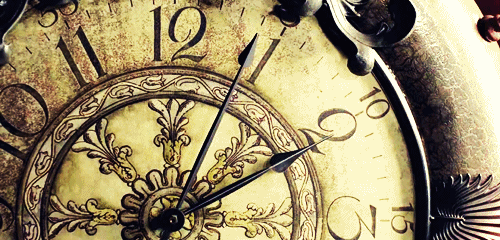
It seems like a blur.
I feel like I am standing still in the middle of crowd as people walked passed me – not brushing or bumping – but just passing by me.

I feel tired and drained, but relieved and joyous. I am not feeling nostalgic or sad – but I do feel scared. I look haggard.

My son graduates on Saturday. That is, note dear reader, tomorrow.
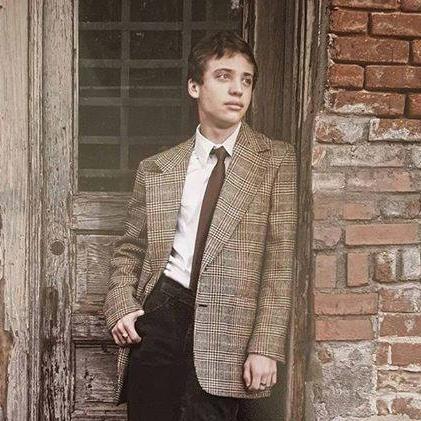
Our journey began when we when middle school wasn’t working for us. In 2011, my son didn’t “bounce” well at our local middle school. Of course, he had just survived a divorce (2010) and a surprise “Mom has met someone” in 2011, where I blended a family in five months. So, sixth grade wasn’t a good start. We decided on private school – a very small one – and he was happy there. It was a good situation – where I am still good friends with the headmistress to this day. She had mentioned “homeschool” once to me and I commented that during in the spring, summer, and fall of 1988, I had been homeschooled due to the Georgia Basic Skills Test. I had failed the math twice – and I had a possible learning disability. Homeschool gave me the one on one ability to get help and members of our church provided my public school teaching parents the idea. My parents, note, taught public school during that time – but I was at home, with my grandmother, tutor, and the local public library to do my school work. We used Abeka.

Little did I know, that day I left Romy Strickland’s office, would I end up spending four years of my life as a full-time homeschool educator. My background is a PreK-12 grade certified, experienced school library media specialist. With the years in public school being at year #17, I had never been a stay at home mother – but a working one. I am an excellent educator: but I never knew my hardest student – and hardest years – would be educating my Ian.
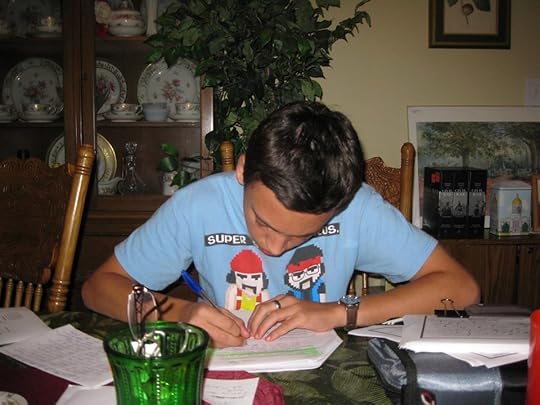
Ever try to educate your mini-me at ages 14-17? I would quickly learn why my mother was frustrated in 1988 – and said I was her hardest student. Her words? “You are getting it back – I’m enjoying this…” Not all days were bad or hard – but I look back and I could do some choices better or chosen some things different. I should have been more patient. I should have allowed him more say so in his literature. We should have done more Move On When Ready than we did. Excuse me, note I say “we,” well, in homeschool, it is a “we” because the parent is the teacher, principal, coach, school counselor, librarian, etc. But life is 20/20 anyway. Ian’s pensive face in this picture may agree.
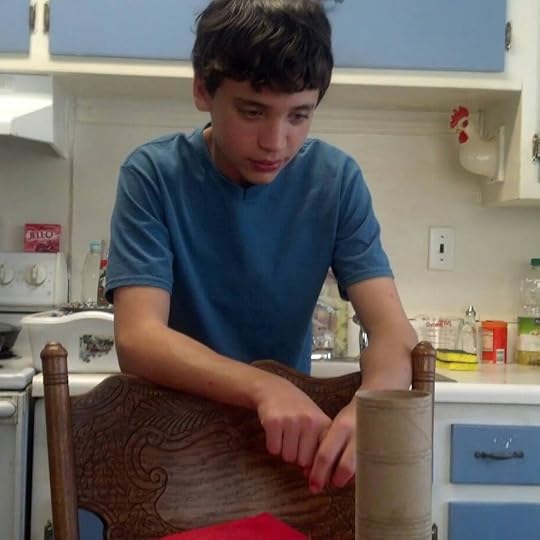
In one day, my son graduates from homeschool – we will forget his middle school years of “ping pong” of homeschool to public to online K12 school – but his high school years. My son did a traditional ninth grade homeschool year (all books) to a hybid double year of online classes for 10th and 11th grade. It was a cool year that year: the English and Social Studies classes were uniquely combined in a specialized way: for example, when he learned about American History in the area of the Industrial Revolution, we read Chicago by Carl Sandburg and wrote about the rise of American unions. A social studies rich curriculum were our tickets to get two years of World History/World Literature and American Literature/ American History completed in a positive year. It was probably the most unique curriculum I have ever came up with. We did our homeschool when we traveled too. Chemistry, Trig, Biology, etc were done with Time4Learning and Ian had a tutor with Time4Writing to work with his compositions. His foreign language was done with Rosetta Stone and other resources.
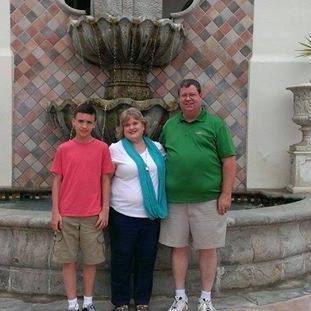
Besides the National History Bee, Ian is wrapping up his Eagle Scout, learned Krav Maga, enjoyed pursuing his musical ability, did dual enrollment for a year of Criminal Justice, and did dual enrollment in a semester of carpentry skills. He learned to ride a scooter and spent a year driving me around to learn how to drive. We must have driven Oak Hill Cemetery in Griffin for months, daily. Ian loved his scooter. He earned his driver’s license in June, 2016 the same week he started his first job as an usher in a movie theatre.

He apprenticed in a first professional job as a control burner with Hill Forestry Management. He will return to his job in August after enjoying his summer off. Ian is doing a “gap year” before deciding on college or technical school. This is an example of the work he does as a control burner. He enjoys forestry – so it will be interesting Ian will decided to do after his gap year.

Ian has maintained a 3.6 GPA with a technical and college prep diploma from George D. Carlin Memorial. He named his homeschooling high school “George D. Carlin Memorial” after this guy.
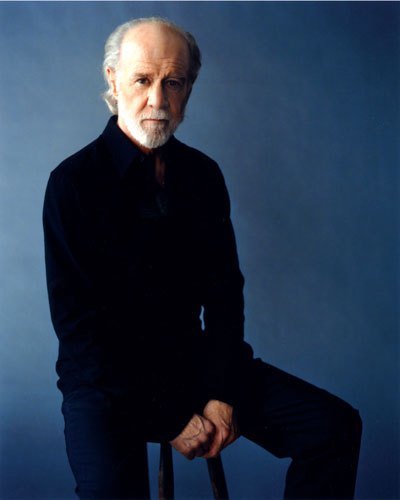
He traveled a good bit over the years, especially seeing Merle Haggard in his last concert, enjoyed Weird Al, and he also took a huge Eastern Kentucky tour to see where his people are from at Boonesborough. Here, he is at Brothers Again where his great great great grandfather is honored as a Confederate soldier who got galvanized, Sgt. Henry Combs.
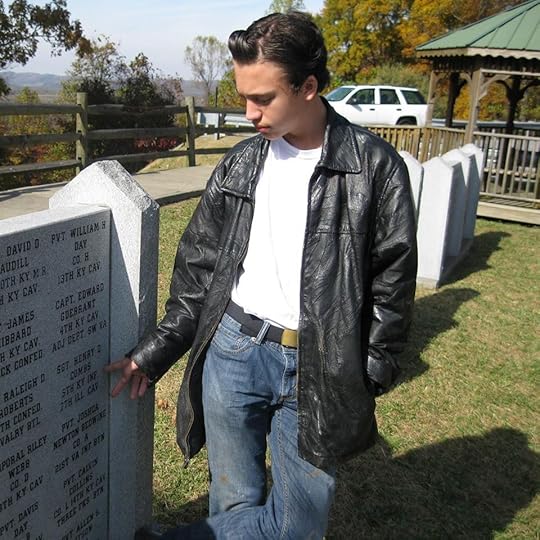
So many people are part of our journey:
Ian’s Krav Maga teacher, Tony Brown… I cannot thank him enough.
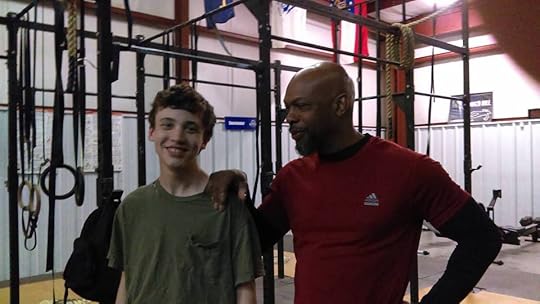


 Us – especially his stepfather for Math and Science Fair project (of which he came first place – it wasn’t publicized, but oh, the little email confirmed: it won – he decided not to go to Regionals, which upset me in my quest to show homeschool kids can kick butt. This was Ian at his State History Bee Competition that got him qualified for Nationals (the first time).
Us – especially his stepfather for Math and Science Fair project (of which he came first place – it wasn’t publicized, but oh, the little email confirmed: it won – he decided not to go to Regionals, which upset me in my quest to show homeschool kids can kick butt. This was Ian at his State History Bee Competition that got him qualified for Nationals (the first time).
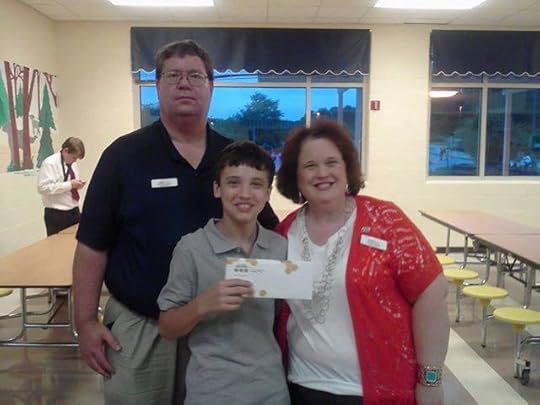
Scouts – his friends gained Eagle and although he is a year younger, he will follow them very soon. He has Family Life to complete, his Scout project, and BOR. We hope Ian will be done by Christmas (and get his library card in September too… Note the reminder…).

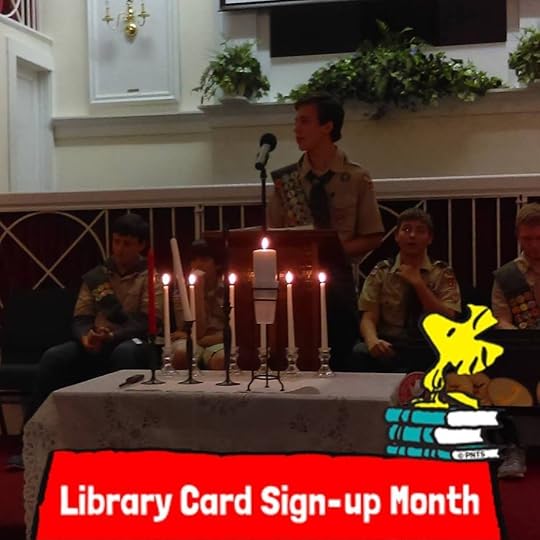
We won’t forget his mascots, Blau (now Juno and living in South Georgia) and of course, Teddy.
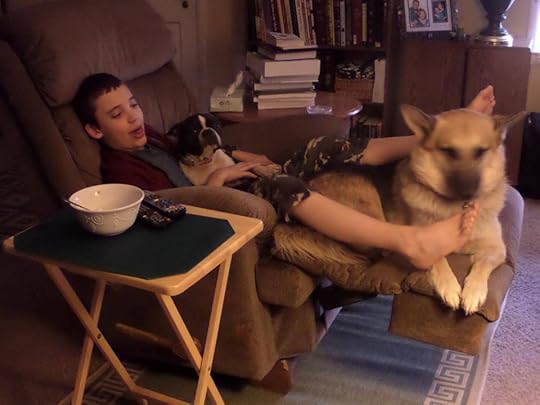
We blended a family in these years.

Now for the mini-lesson!
British Literature was calm waters this year – and I held back my favorite poem for my son until this blog. He skipped John Donne in British Literature because I treasure this poem above all others. What is it? Ian, please read it in Elizabethan English:
No man is an Iland, intire of it selfe; every man is a peece of the Continent, a part of the maine; if a Clod bee washed away by the Sea, Europe is the lesse, as well as if a Promontorie were, as well as if a Man nor of thy friends or of thine owne were; any mans death diminishes me, because I am involved in Mankinde; And therefore never send to know for whom the bell tolls; It tolls for thee.t, let’s get it in the proper reading of Donne’s time. From: MEDITATION XVII Devotions upon Emergent Occasions John Donne

John Donne was the opposite of us: he was reared Catholic but became an Anglican. I encourage you to read more on his life to see what caused his conversion during Elizabeth I and James I. He was married to the love of his life, but her constant childbearing killed her – with their last child. His early poetry tended to be a bit… naughty… but the older he got, the more proper he became and religiously bent. Yes, Ian, more of that stodgy British poetry you hated, but take this one in, like a breath of fresh air on a beautiful morning… (I’m working on little sleep, okay?):
Now, try it in Modern English:
No Man Is An Island
No man is an island,
Entire of itself,
Every man is a piece of the continent,
A part of the main.
If a clod be washed away by the sea,
Europe is the less.
As well as if a promontory were.
As well as if a manor of thy friend’s
Or of thine own were:
Any man’s death diminishes me,
Because I am involved in mankind,
And therefore never send to know for whom the bell tolls;
It tolls for thee.
I am hoping my you remember the Hemingway usage in the second to the last line, but it is what this verse is saying to us. I always believed Donne was pointing out our earthly mortality – and other people’s mortality – and when we hear a funeral bell “toil” it is a reminder we are nearer to dying, each day. It can also mean that we should not be isolated from other people, but be active participants in one another’s lives – and that when someone dies physically, part of our own soul dies. My college professor, the great James Cook, was amused at my reference to the below commercial – because the goal is the same: everyone be part of something and not alone… I used the old Coke commercial of my youth. He laughed – it stuck with me. Hey, it’s the last English lesson you will ever get from.
Think about the old Coke commercial I showed you a few years ago: care about your fellow man – and what his and your place in the world is about – and why you should care.
That is my last British Literature lesson to you, Ian, and I wish you to be a “part of the main” for the rest of your life. Care about people. Love them. Accept people. Have patience. Practice kindness. Role-model. Have expectations – with a high tolerance for ambiguity too. Be happy – find your passions – do your passions. Marry someone you can talk to and kiss forever. In short, be happy, my son. When you have a bad day, open two Cokes and share with a friend – continue to be the friend you are.
Congratulations on your big day, Ian. I am very proud of you – and guess what?

YOU did it!
Now, finish your Eagle!
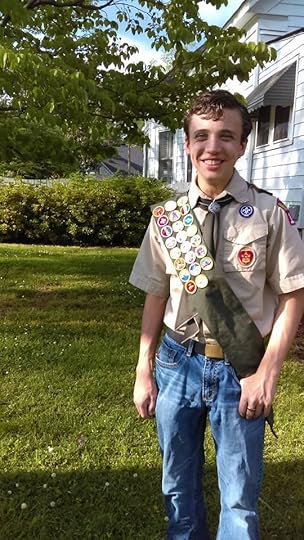


May 29, 2017
Lee’s Pardon Or Seward’s Second Folly
In 1867, the United States Secretary of State, William Seward, is known for “Seward’s Folly” – the purchasing of Alaska from Russia for $7,000,000 dollars. Some people may think it was great bang for the United States buck with two cents an acre, but many Americans were upset. I personally think his first folly was an amazing decision: it is a second folly I would like to share with the world, especially with the rampant revisionism going through the United States to remove monuments of leaders from the War Between the States. I personally give Seward a footnote in my history book as being an irresponsible civil servant – with a bone to pick with General Robert E. Lee.
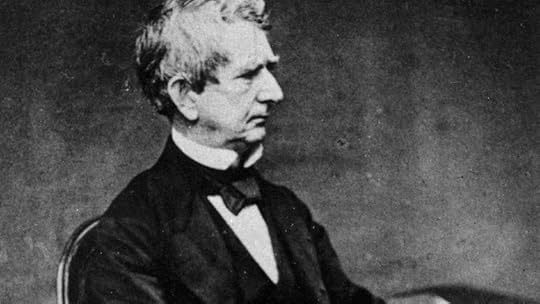
I introduce, again, my hero and fellow native Virginian, General Robert Edward Lee. Wounds must heal, he believed. Division isn’t good, he wrote. Further, without elaboration, in 1865, Robert E. Lee wrote to a former Confederate soldier concerning his signing the Oath of Allegiance, and I quote: “This war, being at an end, the Southern States having laid down their arms, and the questions at issue between them and the Northern States having been decided, I believe it to be the duty of everyone to unite in the restoration of the country and the reestablishment of peace and harmony.”

On October 2, 1865, General Lee became the administrator of a small Presbyterian college that needed him, Washington College. At the same time, he wrote for a pardon to restore his United States citizenship. Once head of the Confederate forces, Robert E. Lee was a beloved leader of the South – a revered and respected man of his own enemies. A devout Christian and family man, his goal after the war was to care for his ailing wife and provide a home for his daughters too. Losing Arlington had been devastating to the great granddaughter of Martha Washington (step great granddaughter to President George Washington), but both of Lee’s sons held onto their land – but Robert and his girls needed a home: Lexington, Virginia provided it. Ironically, he would live out the rest of his days as an educator to young men – encouraging reunification with the Union and being the sole originator to ending a war that had ripped our country apart: the April, 1865 surrender at Appomattox Courthouse, Virginia was to end further bloodshed – without the permission of the president of the Confederacy, Jefferson Davis.
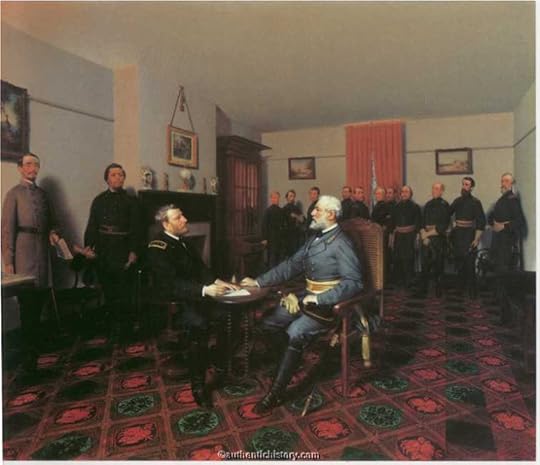
The new American president, the successor to the slain Abraham Lincoln, issued a Proclamation of Amnesty and Pardon to men who had participated in the “rebellion against the United States.” There were excepted classes – fourteen in total – and members of these classes had to make a direct and special application to the president. This law went into effect on May 29, 1865.
On June 13, 1865, General Lee sent an application to President Johnson for Parole. He sent his amnesty oath in October.
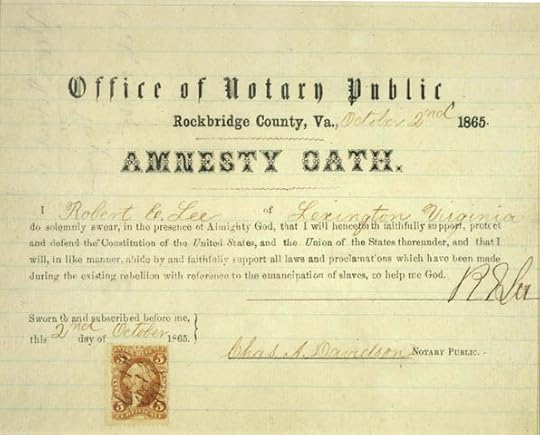
All were sent, individually, to Secretary of State Seward, of whom was to turn them over to President Johnson. Upon arrival of the amnesty oath, an amused Seward (of whom needed another good beating by a Southerner for doing this deed – he had survived the attempted assassination in his home the night Lincoln was killed in April, 1865) decided to give the pardon to a friend as a momento. I call this “Seward’s Second Folly” for a reason: it was deliberate choice to hurt Lee – and one that would last for over a hundred years. Seward abused his honor, his very job role, and didn’t obey his President’s own decree.
The pardon and return to citizenship never came – Lee waited – and perhaps wondered. He moved onto his career as an educator and college administrator. He continued to preach reunification and even toured the South and spoke to Congress – Lee’s last five years were spent at his beautiful and beloved college, mentoring young students and enjoying his family.
In 1970, an archivist stumbled upon Lee’s request for a pardon and citizenship restoration. Imagine what her shock must have been! I personally call her find “The Find of the Century!” In 1975, Lee’s full rights of citizenship were posthumously restored by a joint congressional resolution effective June 13, 1865.
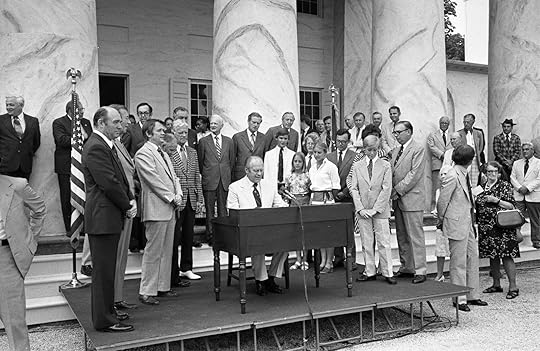
On August 5, 1975, President Gerald Ford proclaimed, “As a soldier, General Lee left his mark on military strategy. As a man, he stood as the symbol of valor and of duty. As an educator, he appealed to reason and learning to achieve understanding and to build a stronger nation. The course he chose after the war became a symbol to all those who had marched with him in the bitter years towards Appomattox. General Lee’s character has been an example to succeeding generations, making the restoration of his citizenship an event in which every American can take pride. In approving this Joint Resolution, the Congress removed the legal obstacle to citizenship which resulted from General Lee’s Civil War service. Although more than a century late, I am delighted to sign this resolution and to complete the full restoration of General Lee’s citizenship.”
As enacted, S.J. Resolution 23 is Public Law 94-67 (89 Stat. 380) – Robert E. Lee regained his citizenship and was given a complete pardon. He had been dead since 1870. One hundred and five years – Lee was again an American citizen and cleared of his choices in the War Between the States.
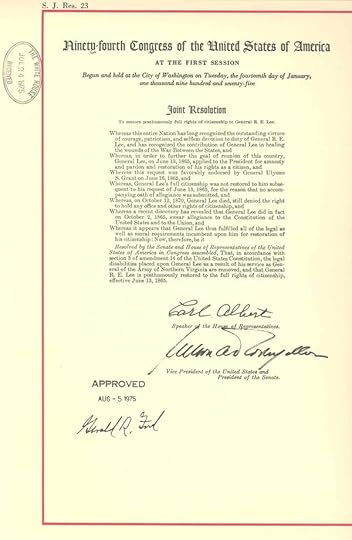
It is very important, during this wave of revisionism in the United States, in this year of 2017, that we remember that the General Robert E. Lee was pardoned – indeed, during my lifetime – and to remove any monuments to him is to slap us in the face that he is and was…
An American, in full pardon and citizenship, of the United States of America. We owe him an apology – he doesn’t owe us one: for he already had given it. As I go to bed tonight, my fellow Virginian – and American – still stands, in memory in monuments in Richmond and in cities and towns all over America, waiting to see if revisionism will topple him.
I pray the craziness – indeed a cultural war over revisionism and political correctness will end where General Lee could say quite simple:



May 28, 2017
Sliding Into A Picture
Once a year, I make a visit. The visit is a straight I-75 drive from my native Griffin, GA to Adel, GA. I visit my high school male best friend. The first time I visited his grave, it ripped my heart out. I cried. You do that when a life ends too young. I will never have closure from this death, as many others do not. I haven’t spoken to his family in years – although I adored his mother. If she reads this, I want her to know how much her son meant to me – and the story and legacy he has in my life. Brett Warren was part of a select group of individuals who helped save my life when I suffered from great depression – and how he was the definition of a friend.
As the years passed with Brett’s death, it got easier to visit his grave. Memories helped. To be blunt and honest, we had grown apart a bit – and become lazy in the relationship, but we remained in contact: he helped my former husband get help for some dental issues, he twice worked on my teeth (and plotted my veneer re-do) and we had dinner a few times. He had become a dentist and I became a librarian. Our last visit, he and I hung out in a parking lot and we played with my toddler – the sun was shining and all was good in our world: he had big plans and I had my miracle child. Most conversations were by phone – with my teasing him with dental jokes or he would listen to something going on in my life. Always, I was the funny one and he was the serious one. I missed his last call to me – two weeks before his death. A message on an answering machine haunts me – it was a simple, “Anne, please give me a call when you get this…” And I didn’t call him back. I wished I had called him back. To my dying day, that is my biggest regret.
I have few pictures of us together. After he died, I went into my father’s attic to hunt for an old slide. In our youth, we did two photography projects together. That is how met Brett – or as he would become when we grew up – Dr. Brett Warren. His dream was to become a dentist – and he achieved his goals.
Brett was one of the top brains in our school. The gifted students were worlds away from the regular students – or so I thought. I have no memories of Brett until the day he showed up at my father’s house to work on a photography project with another student – and pretty much took over my father’s attention. I resented him from the get-go and would pester the boys when they visited. He and I would argue over everything – and as much as I tried to drive him away (even at the school, during photography meetings), he stuck around. After months of back and forth bickering, he suggested we make peace and be friends. I guess he realized I was jealous – and I admitted it. We were fourteen years old.
I had no idea he would become so dear to me.
The picture I am sharing is from our 1987-1988 Media Festival project. It was our New Echota (Cherokee capital) photography slides with tape narration project that went to state level in competition. After Brett’s death and as I mentioned earlier in this blog, I hunted down the slide of our author’s page of the project and put it in an envelope. It remained in my Bible, treasured, until my husband surprised me with the development of the slide into a picture. It was never seen outside of the project until tonight. In this picture, Brett and I were fifteen years old.
What struck me: youth. How young we were. The smirk on Brett’s face to hear my father yell at me (obviously, running my mouth) to be quiet so he could take a picture for the author’s page. The “Old Dude” (as he was known to us in the picture) had commented Brett and I argued like an old married couple and should date – we immediately went “EWWWW…” That’s the type of relationship I had with Brett: he was so serious to my party time, excellent. There is a backstory to this picture – but the basics are treasured. I never knew that picture would stir up so many happy memories – and bring back other ones.
In 1991, when I was in the worst situation of my life, I wrote him a letter, begging for advice. I was too ashamed to call him and tell him how I had screwed up my life, but I wanted his input. His answer was to descend upon my doorstep and give me advice that would have solved my problem – and I didn’t listen. For about three years, I would call him, in great depression, and he would counsel me. He always made time – and trust me, as a busy student, he didn’t have that time. He never threw up I had made a mistake – and he listened. Brett always listened. He was a perfectionist, had opinions, argued with a fence post, but when it came to my grief and guilt in that situation, he was part of the team that saved my life – by just listening. He told me, in 1993, that he thought I may be suffering from depression and that I needed to get help – I listened.
When he needed me, I didn’t make time for Brett. I should have called him back. If I could turn back time, I would in a heartbeat. His legacy to me is something that will never, ever leave me: with my students, friends, and family: listen, speak up, do something – show up on that doorstep – be a friend. We can all use a friend like Dr. Brett Warren was to me. Since his death, I have listened up, spoken up, and done something for many – because I don’t ever ever want to just have…
A slide made into a picture.





